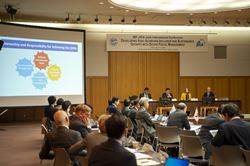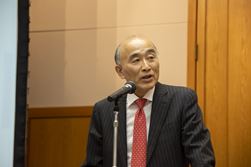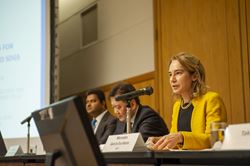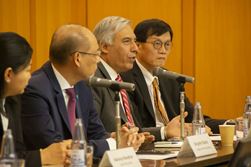News from Asia and the Pacific
Asian Officials Benefitted from Peer-to-Peer Discussions on Inclusive and Sustainable Growth
 February 13, 2020, Tokyo, Japan – Policymakers from Asian emerging and developing countries at a conference in Tokyo today exchanged views and deepened their knowledge on how to achieve more inclusive and sustainable growth while striking a balance between investment needs for development and sound fiscal policies.
February 13, 2020, Tokyo, Japan – Policymakers from Asian emerging and developing countries at a conference in Tokyo today exchanged views and deepened their knowledge on how to achieve more inclusive and sustainable growth while striking a balance between investment needs for development and sound fiscal policies.
The conference “Developing Asia: Achieving Inclusive and Sustainable Growth with Sound Fiscal Management”, co-organized by the IMF and the Japan International Cooperation Agency (JICA), brought together 24 policymakers including finance ministers and central bank governors for peer-to-peer policy discussions. Economists and specialists from the IMF’s various departments and JICA shared their latest studies and research findings to stimulate the discussions.
 Opening the conference, IMF Deputy Managing Director Mitsuhiro Furusawa said that countries around the globe need to invest more to make significant progress on the Sustainable Development Goals (SDGs) in various sectors such as education, health, roads, electricity, and water and sanitation. “Additional spending required for meaningful progress on SDGs in these areas by 2030 is quite large,” said Furusawa, citing IMF research that developing countries around the globe need to gradually increase their spending to meet these goals by up to an estimated 15 percentage points of their combined GDP in 2030. He then stressed that generating more domestic tax revenue, spending better and strengthening public debt management are key to achieving inclusive and sustainable growth, and asked the participants share their expertise in those areas.
Opening the conference, IMF Deputy Managing Director Mitsuhiro Furusawa said that countries around the globe need to invest more to make significant progress on the Sustainable Development Goals (SDGs) in various sectors such as education, health, roads, electricity, and water and sanitation. “Additional spending required for meaningful progress on SDGs in these areas by 2030 is quite large,” said Furusawa, citing IMF research that developing countries around the globe need to gradually increase their spending to meet these goals by up to an estimated 15 percentage points of their combined GDP in 2030. He then stressed that generating more domestic tax revenue, spending better and strengthening public debt management are key to achieving inclusive and sustainable growth, and asked the participants share their expertise in those areas.
The conference covered topics ranging from the costs of achieving key SDGs to the reform of public finance management.
 In the morning sessions, Mercedes Garcia-Escribano of the IMF Fiscal Affairs Department showed how much more needs to be spent in Asia to realize the SDGs. She said that spending increases for emerging and developing countries in Asia would amount to 10 percentage points of their GDP in 2030, and added that it is critical to increase tax revenue through structural reforms, to spend more efficiently through public financial management reforms, and to boost debt transparency by providing accurate, comprehensive and timely debt data. Participants from Egypt and Lao PDR, meanwhile, highlighted how their government institutions are collaborating to increase the efficiency of planning and spending for universal health care to support more inclusive growth through healthier populations.
In the morning sessions, Mercedes Garcia-Escribano of the IMF Fiscal Affairs Department showed how much more needs to be spent in Asia to realize the SDGs. She said that spending increases for emerging and developing countries in Asia would amount to 10 percentage points of their GDP in 2030, and added that it is critical to increase tax revenue through structural reforms, to spend more efficiently through public financial management reforms, and to boost debt transparency by providing accurate, comprehensive and timely debt data. Participants from Egypt and Lao PDR, meanwhile, highlighted how their government institutions are collaborating to increase the efficiency of planning and spending for universal health care to support more inclusive growth through healthier populations.
In the afternoon sessions, discussions focused on South Asia and public finance management. While IMF Asia and Pacific Department economist Andrew Hodge said that South Asia needs to improve productivity in agriculture, expand the manufacturing sector and promote higher-skill services, other presenters from the region shared their experiences in managing debt to help support development objectives. Holger van Eden of the IMF Capacity Development Office in Thailand also introduced public financial management reforms that are taking place in Asian countries, including in such key areas as public investment management and performance budgeting.
 Wrapping up the day-long conference, the participants exchanged views and shared experiences during a round table discussion. Afghanistan’s Finance Minister Mohammad Humayon Qayoumi stressed the importance of educating people, especially women, in technology to make growth more inclusive while Banko Sentral ng Pilipinas Governor Benjamin Diokno shared that the Philippines’ efforts to introduce an electronic retail payments system will increase financial security, deepen financial inclusion and help curb corruption. Other participants from Lao PDR, Mongolia, and JICA discussed how best to ensure political commitment and gain public support for fiscal discipline while pursing development objectives, how to support women’s participation in the labor force through better spending on maternal health, and ways to manage public private partnerships to help ensure high-quality infrastructure investment.
Wrapping up the day-long conference, the participants exchanged views and shared experiences during a round table discussion. Afghanistan’s Finance Minister Mohammad Humayon Qayoumi stressed the importance of educating people, especially women, in technology to make growth more inclusive while Banko Sentral ng Pilipinas Governor Benjamin Diokno shared that the Philippines’ efforts to introduce an electronic retail payments system will increase financial security, deepen financial inclusion and help curb corruption. Other participants from Lao PDR, Mongolia, and JICA discussed how best to ensure political commitment and gain public support for fiscal discipline while pursing development objectives, how to support women’s participation in the labor force through better spending on maternal health, and ways to manage public private partnerships to help ensure high-quality infrastructure investment.
The conference was the fifth in the series since 2011. The IMF will continue to cooperate with other institutions to support its member countries to achieve the SDGs in the context of inclusive and sustainable growth and economic policies.






